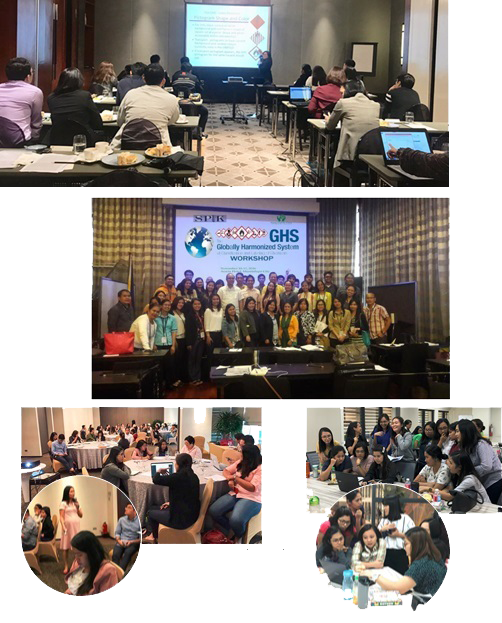
Responsible Care

Responsible Care (RC) is the global voluntary initiative of the chemical industry that commits its management policy to secure and protect the environment, health, safety and security (EHS&S) of its stakeholders.
PROTECTING THE COMMUNITY
Responsible Care is an ethic, attitude, and philosophy of thinking by companies on how to conduct business and relate this to their role in society. It emphasizes corporate values that embody a long-term commitment to the community on matters of occupational health and safety, and in environmental protection. Thus, Responsible Care requires continuous performance improvement. The ethics of Responsible Care are defined in the Guiding Principles signed by CEOs of companies committing to Responsible Care.


SEVEN CODES OF MANAGEMENT PRACTICES
Responsible Care goes beyond what is legally required in most countries. It commits companies to improve environmental, health and safety performance through the implementation of the Seven Codes of Management Practices recommended in the program. These Codes stretch and are practiced across all business activities, guided by a set of management systems.
SHARING BEST PRACTICES
Responsible Care is more than a set of principles and declarations. Through the sharing of information and a rigorous system of checklists, performance indicators and verification procedures, it enables the industry to demonstrate how it has improved over the years and how it has developed policies for further improvement. In these way, Responsible Care helps the industry gain public trust to operate safely, profitably and with due care for future generations. The benefits can be improved productivity, better quality products, lower consumption of energy and water, less generation of waste, and reduced Insurance premiums.

History and Responsible Care® Worldwide
Responsible Care began in Canada in 1984 to address public concerns about the manufacture, distribution and use of chemicals. It was quickly picked up by the United States and soon spread to Europe and across the Pacific, Japan and the Far East countries.
During the United Nations Conference on Environment and Development (UNCED) held in 1992, Agenda 21: ”Action Program for the Sustainable Development of Mankind’ was adopted. Chapter 19 of the document (Environmentally Sound Management of Toxic Chemicals, including Prevention of Illegal International Traffic in Toxic and Dangerous Products) encouraged business firms to promote Responsible Care. In Chapter 30 (Strengthening the Role of Business and Industry), implementation of Responsible Care was identified as a voluntary initiative that plays a meaningful and important role for the realization of Agenda 21. When Agenda 21 was adopted at this Rio Earth Summit, the number of chemical industry associations embracing Responsible Care grew from 6 to 47 countries.
In that same year, the Program Report on Responsible Care submitted by the International Council of Chemical Associations was awarded by ICC/UNEP with the “Global Summit Business Award for Sustainable Development Partnership”.
During the first meeting of the Inter-governmental Forum on Chemical Safety (IFCS) held to substantiate the policy stated in Chapter 19 of Agenda 21, the Ethical Code concerning the International Trade of Chemical Substances formulated by the United Nations Environment Program (UNEP) was decided as a priority action plan. In the Ethical Code, Responsible Care was recognized as an activity that may replace the implementation of the Ethical Code.
As a voluntary initiative of the global chemical industry, Responsible Care has become an essential program of sustainable development recognized by the United Nations as well as other international organizations and governments.
The global Responsible Care initiative is managed by the Responsible Care Leadership Group (RCLG) of the International Council of Chemical Associations (ICCA).
Responsible Care® in the Philippines
Responsible Care was introduced to the Philippines in 1994 by leading multinational companies with local manufacturing operations. It was soon adopted as a major program by the Samahan sa Pilipinas ng mga Industriyang Kimika (SPIK). SPIK, through the cooperation of the Chemical Manufacturers Association of the United States (CMA), introduced the program with a series of orientation seminars and workshops for local chemical companies.
In 1996, the SPIK Responsible Care Program received its charter from the International Council of Chemical Associations (ICCA). It was formally launched in March of the same year with 19 SPIK member companies participating. This led to the organization of the SPIK Responsible Care Council (SRCC) that is tasked to coordinate the efforts in the promotion of Responsible Care and to monitor the industry-wide implementation among signatories.
Although stunted by the 1997 Asian financial crisis, growth of Responsible Care in the country regained momentum three years later. The program’s achievements and present status are described in the last three public reports prepared and published by the SPIK Responsible Care Council.
The Philippines’ Responsible Care Program is managed by the Samahan sa Pilipinas ng mga Industriyang Kimika (SPIK).
